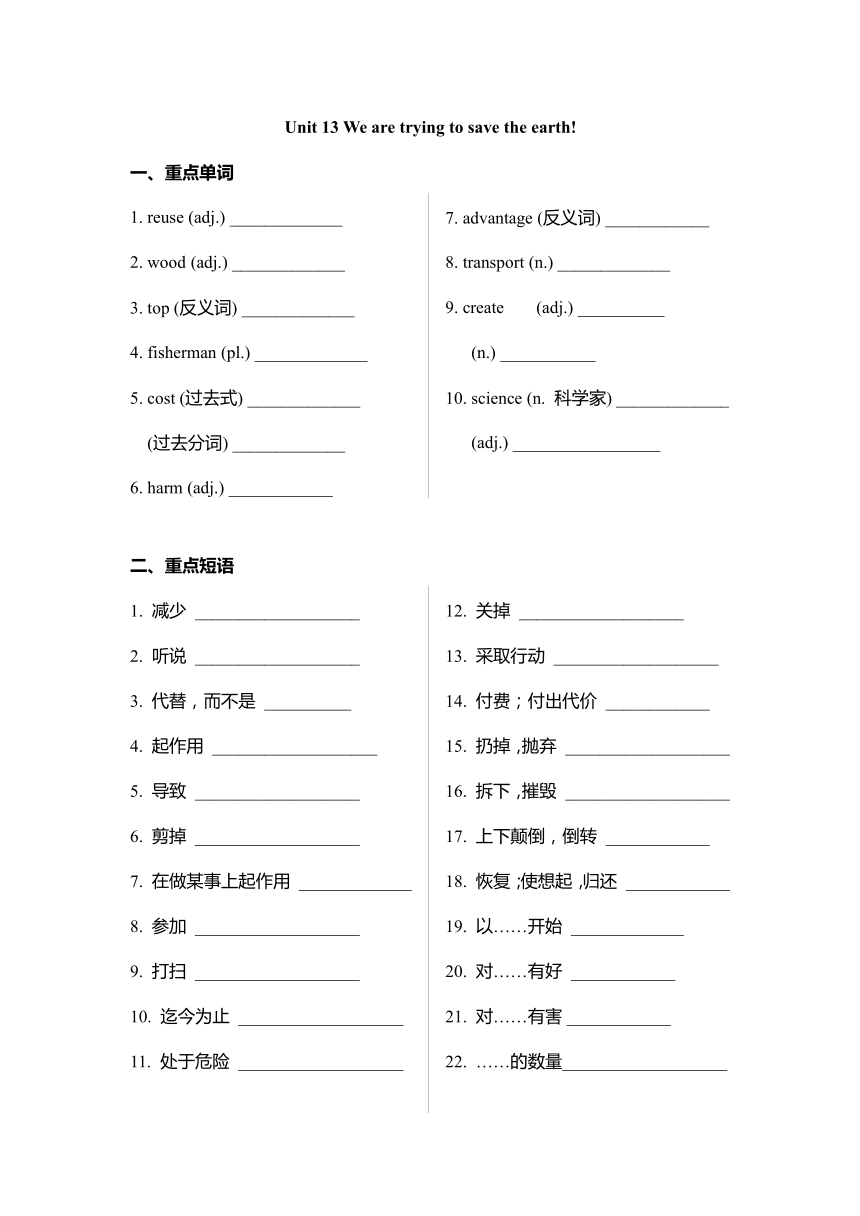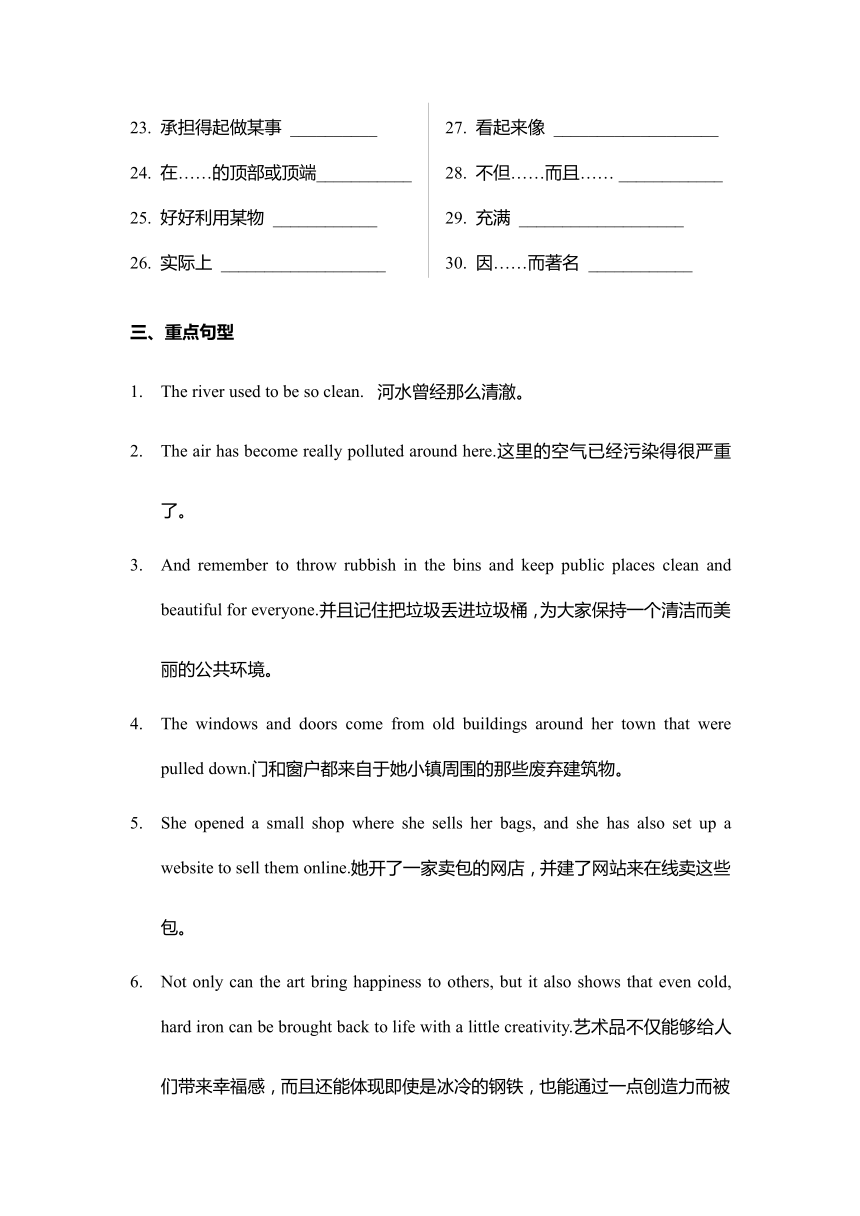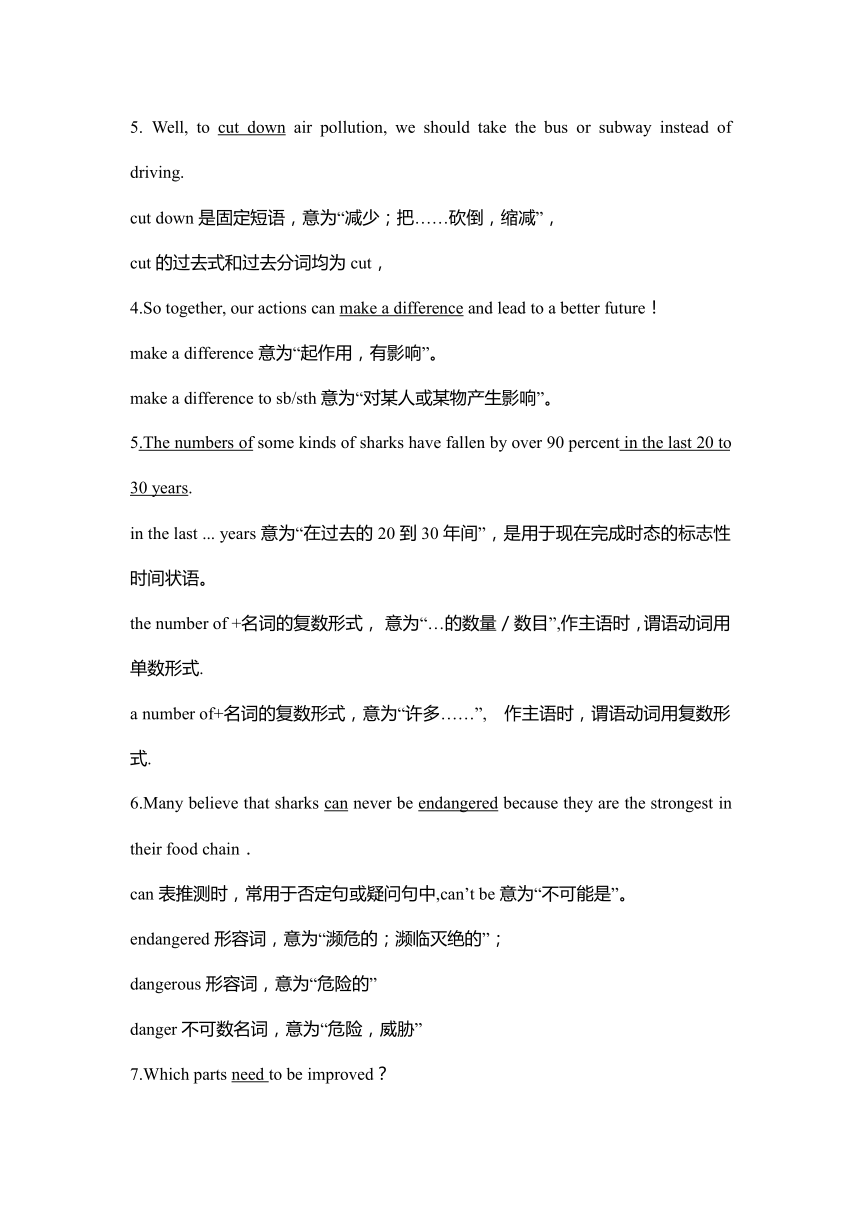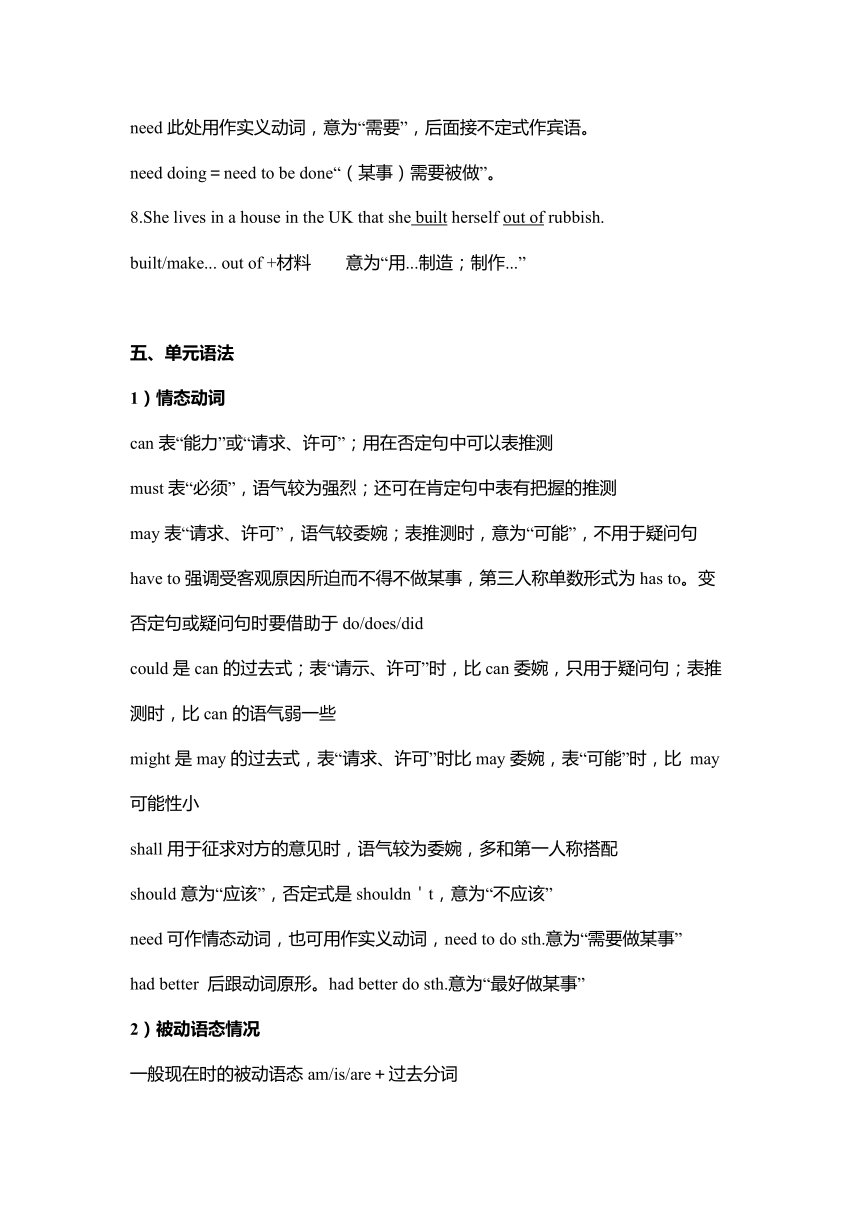期末复习Unit13 句型知识点与语法练习 (无答案)
文档属性
| 名称 | 期末复习Unit13 句型知识点与语法练习 (无答案) |

|
|
| 格式 | docx | ||
| 文件大小 | 28.2KB | ||
| 资源类型 | 教案 | ||
| 版本资源 | 人教新目标(Go for it)版 | ||
| 科目 | 英语 | ||
| 更新时间 | 2024-01-15 11:21:05 | ||
图片预览





文档简介
Unit 13 We are trying to save the earth!
一、重点单词
1. reuse (adj.) _____________
2. wood (adj.) _____________
3. top (反义词) _____________
4. fisherman (pl.) _____________
5. cost (过去式) _____________
(过去分词) _____________
6. harm (adj.) ____________
7. advantage (反义词) ____________
8. transport (n.) _____________
9. create (adj.) __________
(n.) ___________
10. science (n. 科学家) _____________
(adj.) _________________
二、重点短语
1. 减少 ___________________
2. 听说 ___________________
3. 代替,而不是 __________
4. 起作用 ___________________
5. 导致 ___________________
6. 剪掉 ___________________
7. 在做某事上起作用 _____________
8. 参加 ___________________
9. 打扫 ___________________
10. 迄今为止 ___________________
11. 处于危险 ___________________
12. 关掉 ___________________
13. 采取行动 ___________________
14. 付费;付出代价 ____________
15. 扔掉,抛弃 ___________________
16. 拆下,摧毁 ___________________
17. 上下颠倒,倒转 ____________
18. 恢复;使想起,归还 ____________
19. 以……开始 _____________
20. 对……有好 ____________
21. 对……有害 ____________
22. ……的数量___________________
23. 承担得起做某事 __________
24. 在……的顶部或顶端___________
25. 好好利用某物 ____________
26. 实际上 ___________________
27. 看起来像 ___________________
28. 不但……而且…… ____________
29. 充满 ___________________
30. 因……而著名 ____________
三、重点句型
The river used to be so clean. 河水曾经那么清澈。
The air has become really polluted around here.这里的空气已经污染得很严重了。
And remember to throw rubbish in the bins and keep public places clean and beautiful for everyone.并且记住把垃圾丢进垃圾桶,为大家保持一个清洁而美丽的公共环境。
The windows and doors come from old buildings around her town that were pulled down.门和窗户都来自于她小镇周围的那些废弃建筑物。
She opened a small shop where she sells her bags, and she has also set up a website to sell them online.她开了一家卖包的网店,并建了网站来在线卖这些包。
Not only can the art bring happiness to others, but it also shows that even cold, hard iron can be brought back to life with a little creativity.艺术品不仅能够给人们带来幸福感,而且还能体现即使是冰冷的钢铁,也能通过一点创造力而被赋予生命力。
四、句子所含知识点
1. We’re trying to save the earth!
Everyone in this town should play a part in cleaning it up.
Well, to cut down air pollution, we should take the bus or subway instead of driving.
4.So together, our actions can make a difference and lead to a better future!
5.The numbers of some kinds of sharks have fallen by over 90 percent in the last 20 to 30 years.
6.Many believe that sharks can never be endangered because they are the strongest in their food chain.
7.Which parts need to be improved?
8.She lives in a house in the UK that she built herself out of rubbish.
详解版
1. We’re trying to save the earth!
try to do意为“尽力做某事”;
try doing意为“尝试做某事”
Everyone in this town should play a part in cleaning it up.
play a part in=take part in 意为“参与;在某方面起作用”
Well, to cut down air pollution, we should take the bus or subway instead of driving.
cut down是固定短语,意为“减少;把……砍倒,缩减”,
cut的过去式和过去分词均为cut,
4.So together, our actions can make a difference and lead to a better future!
make a difference意为“起作用,有影响”。
make a difference to sb/sth意为“对某人或某物产生影响”。
5.The numbers of some kinds of sharks have fallen by over 90 percent in the last 20 to 30 years.
in the last ... years意为“在过去的20到30年间”,是用于现在完成时态的标志性时间状语。
the number of +名词的复数形式, 意为“…的数量/数目”,作主语时,谓语动词用单数形式.
a number of+名词的复数形式,意为“许多……”, 作主语时,谓语动词用复数形式.
6.Many believe that sharks can never be endangered because they are the strongest in their food chain.
can表推测时,常用于否定句或疑问句中,can’t be意为“不可能是”。
endangered形容词,意为“濒危的;濒临灭绝的”;
dangerous形容词,意为“危险的”
danger不可数名词,意为“危险,威胁”
7.Which parts need to be improved?
need此处用作实义动词,意为“需要”,后面接不定式作宾语。
need doing=need to be done“(某事)需要被做”。
8.She lives in a house in the UK that she built herself out of rubbish.
built/make... out of +材料 意为“用...制造;制作...”
单元语法
1)情态动词
can表“能力”或“请求、许可”;用在否定句中可以表推测
must表“必须”,语气较为强烈;还可在肯定句中表有把握的推测
may表“请求、许可”,语气较委婉;表推测时,意为“可能”,不用于疑问句
have to强调受客观原因所迫而不得不做某事,第三人称单数形式为has to。变
否定句或疑问句时要借助于do/does/did
could是can的过去式;表“请示、许可”时,比can委婉,只用于疑问句;表推
测时,比can的语气弱一些
might是may的过去式,表“请求、许可”时比may委婉,表“可能”时,比 may
可能性小
shall用于征求对方的意见时,语气较为委婉,多和第一人称搭配
should意为“应该”,否定式是shouldn't,意为“不应该”
need可作情态动词,也可用作实义动词,need to do sth.意为“需要做某事”
had better 后跟动词原形。had better do sth.意为“最好做某事”
2)被动语态情况
一般现在时的被动语态am/is/are+过去分词
一般过去时的被动语态was/were+过去分词
一般将来时的被动语态 am/is/are going to be+过去分词
will/shall be+过去分词
过去将来时的被动语态 would/should be+过去分词
现在进行时的被动语态 am/is/are being+过去分词
过去进行时的被动语态 was/were being+过去分词
现在完成时的被动语态 have/has been+过去分词
过去完成时的被动语态 had been+过去分词
含情态动词的被动语态情态动词+be+过去分词
练习
一、单选题
1. —Are you going to _____ any of the events
—Yes. Maybe long jump and high jump.
A. take part in B. join C. attend D. join in
2. I can’t afford ____ him an expensive birthday present.
A. to buy B. buying C. for buying D. buy
3. —Remember to ____ the lights when you leave the room.
—OK. I will.
A. turn on B. turn down C. turn up D. turn off
4. The girl always has some money to ___ snacks.
A. spend B. pay for C. take D. cost
5. —Look! _____ boys are playing on the playground. —Yes. _____ them is about 200.
A. The number of; A number of B. The number of; The number of
C. A number of; the number of D. A number of; A number of
6.There was a big earthquake in that area,but luckily,many people __________.
A.save B.saved C.are saved D.were saved
7.It's not a good habit to __________ things. You may need them some other time.
A.throw away B.turn off C.take down D.run away
8.The environment in our town is getting worse and worse,so plenty of trees ____________ .
A.are planting B.should be planted C.should plant D.will plant
9. students in this school is about2,000. And students take the bus to school.
A.The number of;the number of B.A number of;a number of
C.A number of;the number of D.The number of;a number of
10.Last year our class set up Reading Corner. So far,we ____________ more than 200 books.
A.were reading B.have read C.will read D.Read
二、用所给词的适当形式填空
1.In China, the 24 solar terms ________ (create) thousands of years ago to guide agricultural production.
2.What a mess! Those shared-bikes ________ (throw) all around. Let’s put them in the right place.
3.It is said that a girl named Jones ________ (kill) in the accident.
4.In Chinese culture, tigers are ________(regard)as a symbol of power, energy and protection.
5.The Hong Kong-Zhuhai-Macao Bridge is ________ (consider) as a wonder.
6. Nothing ________ (be) a waste if you have a creative mind.
7.We _______________(see) many changes in the last few years.
8.Now the air pollution _______________ (get ) worse and worse !
9. On the one hand, we're saying we need _______________(creative).
10.Smoking is_______________(harm ) to your health.
三、根据汉语意思完成下列句子
1.每个人都应该在保护环境上起作用, 毕竟,我们都需要干净的空气和水来生活。
Everyone should______ _____ ___________in _____________the environment ,after all, we need clean______ and water ______ _________.
2.为了解决空气污染的问题,我们必须削减污染的空气进入天空。
____ _______ ______ _______ the problem of air pollution, we must____ ________ or ______ __________ _______ into the sky.
3. 我们的行动会产生影响并且引导一个更好的未来。
Our actions can _______ _____ ____________and _______ _________ a better future .
4. 每当你在享用一碗鱼鳍汤的时候,你意识到了你正在杀死一整条鲨鱼吗?
Do you _________that you_____ ________a whole shark______ _______ you enjoy a bowl of shark _____soup.
5.取鲨鱼的鳍不仅对鲨鱼有害,甚至可能使它们慢慢死亡,而且它也会影响整个海洋生态系统。
Getting fins of sharks is________ _______ _______ _________ sharks ______ it can make sharks slowly die,____ ______ it can influence the whole _________ _______________.
6.你的帮助起了作用。
Your help has .
7.你的小汽车需要维修了。
Your car .
8.这本书一定是汤姆的。他的名字在封面上。
This book Tom's. His name is on the cover.
9.如果你有一个充满创意的头脑,没有东西是废品。
Nothing is a if you have a .
10.我们正在努力拯救地球。
We the .
四、句型转换
1.She has already finished her homework.(改为否定句)
She ________ ________ her homework ________.
2.He made me do homework for him.(改为被动语态)
I was made ________ ________ homework for him.
3.Gina's never been to the Great Wall.(完成反义疑问句)
Gina's never been to the Great Wall, ________ ________
4.The river used to be so clean.(改为一般疑问句)
________ the river ________ to be so clean
5.The little boy bought the toy car two days ago.(改为同义句)
The little boy ________ ________ the toy car for two days.
一、重点单词
1. reuse (adj.) _____________
2. wood (adj.) _____________
3. top (反义词) _____________
4. fisherman (pl.) _____________
5. cost (过去式) _____________
(过去分词) _____________
6. harm (adj.) ____________
7. advantage (反义词) ____________
8. transport (n.) _____________
9. create (adj.) __________
(n.) ___________
10. science (n. 科学家) _____________
(adj.) _________________
二、重点短语
1. 减少 ___________________
2. 听说 ___________________
3. 代替,而不是 __________
4. 起作用 ___________________
5. 导致 ___________________
6. 剪掉 ___________________
7. 在做某事上起作用 _____________
8. 参加 ___________________
9. 打扫 ___________________
10. 迄今为止 ___________________
11. 处于危险 ___________________
12. 关掉 ___________________
13. 采取行动 ___________________
14. 付费;付出代价 ____________
15. 扔掉,抛弃 ___________________
16. 拆下,摧毁 ___________________
17. 上下颠倒,倒转 ____________
18. 恢复;使想起,归还 ____________
19. 以……开始 _____________
20. 对……有好 ____________
21. 对……有害 ____________
22. ……的数量___________________
23. 承担得起做某事 __________
24. 在……的顶部或顶端___________
25. 好好利用某物 ____________
26. 实际上 ___________________
27. 看起来像 ___________________
28. 不但……而且…… ____________
29. 充满 ___________________
30. 因……而著名 ____________
三、重点句型
The river used to be so clean. 河水曾经那么清澈。
The air has become really polluted around here.这里的空气已经污染得很严重了。
And remember to throw rubbish in the bins and keep public places clean and beautiful for everyone.并且记住把垃圾丢进垃圾桶,为大家保持一个清洁而美丽的公共环境。
The windows and doors come from old buildings around her town that were pulled down.门和窗户都来自于她小镇周围的那些废弃建筑物。
She opened a small shop where she sells her bags, and she has also set up a website to sell them online.她开了一家卖包的网店,并建了网站来在线卖这些包。
Not only can the art bring happiness to others, but it also shows that even cold, hard iron can be brought back to life with a little creativity.艺术品不仅能够给人们带来幸福感,而且还能体现即使是冰冷的钢铁,也能通过一点创造力而被赋予生命力。
四、句子所含知识点
1. We’re trying to save the earth!
Everyone in this town should play a part in cleaning it up.
Well, to cut down air pollution, we should take the bus or subway instead of driving.
4.So together, our actions can make a difference and lead to a better future!
5.The numbers of some kinds of sharks have fallen by over 90 percent in the last 20 to 30 years.
6.Many believe that sharks can never be endangered because they are the strongest in their food chain.
7.Which parts need to be improved?
8.She lives in a house in the UK that she built herself out of rubbish.
详解版
1. We’re trying to save the earth!
try to do意为“尽力做某事”;
try doing意为“尝试做某事”
Everyone in this town should play a part in cleaning it up.
play a part in=take part in 意为“参与;在某方面起作用”
Well, to cut down air pollution, we should take the bus or subway instead of driving.
cut down是固定短语,意为“减少;把……砍倒,缩减”,
cut的过去式和过去分词均为cut,
4.So together, our actions can make a difference and lead to a better future!
make a difference意为“起作用,有影响”。
make a difference to sb/sth意为“对某人或某物产生影响”。
5.The numbers of some kinds of sharks have fallen by over 90 percent in the last 20 to 30 years.
in the last ... years意为“在过去的20到30年间”,是用于现在完成时态的标志性时间状语。
the number of +名词的复数形式, 意为“…的数量/数目”,作主语时,谓语动词用单数形式.
a number of+名词的复数形式,意为“许多……”, 作主语时,谓语动词用复数形式.
6.Many believe that sharks can never be endangered because they are the strongest in their food chain.
can表推测时,常用于否定句或疑问句中,can’t be意为“不可能是”。
endangered形容词,意为“濒危的;濒临灭绝的”;
dangerous形容词,意为“危险的”
danger不可数名词,意为“危险,威胁”
7.Which parts need to be improved?
need此处用作实义动词,意为“需要”,后面接不定式作宾语。
need doing=need to be done“(某事)需要被做”。
8.She lives in a house in the UK that she built herself out of rubbish.
built/make... out of +材料 意为“用...制造;制作...”
单元语法
1)情态动词
can表“能力”或“请求、许可”;用在否定句中可以表推测
must表“必须”,语气较为强烈;还可在肯定句中表有把握的推测
may表“请求、许可”,语气较委婉;表推测时,意为“可能”,不用于疑问句
have to强调受客观原因所迫而不得不做某事,第三人称单数形式为has to。变
否定句或疑问句时要借助于do/does/did
could是can的过去式;表“请示、许可”时,比can委婉,只用于疑问句;表推
测时,比can的语气弱一些
might是may的过去式,表“请求、许可”时比may委婉,表“可能”时,比 may
可能性小
shall用于征求对方的意见时,语气较为委婉,多和第一人称搭配
should意为“应该”,否定式是shouldn't,意为“不应该”
need可作情态动词,也可用作实义动词,need to do sth.意为“需要做某事”
had better 后跟动词原形。had better do sth.意为“最好做某事”
2)被动语态情况
一般现在时的被动语态am/is/are+过去分词
一般过去时的被动语态was/were+过去分词
一般将来时的被动语态 am/is/are going to be+过去分词
will/shall be+过去分词
过去将来时的被动语态 would/should be+过去分词
现在进行时的被动语态 am/is/are being+过去分词
过去进行时的被动语态 was/were being+过去分词
现在完成时的被动语态 have/has been+过去分词
过去完成时的被动语态 had been+过去分词
含情态动词的被动语态情态动词+be+过去分词
练习
一、单选题
1. —Are you going to _____ any of the events
—Yes. Maybe long jump and high jump.
A. take part in B. join C. attend D. join in
2. I can’t afford ____ him an expensive birthday present.
A. to buy B. buying C. for buying D. buy
3. —Remember to ____ the lights when you leave the room.
—OK. I will.
A. turn on B. turn down C. turn up D. turn off
4. The girl always has some money to ___ snacks.
A. spend B. pay for C. take D. cost
5. —Look! _____ boys are playing on the playground. —Yes. _____ them is about 200.
A. The number of; A number of B. The number of; The number of
C. A number of; the number of D. A number of; A number of
6.There was a big earthquake in that area,but luckily,many people __________.
A.save B.saved C.are saved D.were saved
7.It's not a good habit to __________ things. You may need them some other time.
A.throw away B.turn off C.take down D.run away
8.The environment in our town is getting worse and worse,so plenty of trees ____________ .
A.are planting B.should be planted C.should plant D.will plant
9. students in this school is about2,000. And students take the bus to school.
A.The number of;the number of B.A number of;a number of
C.A number of;the number of D.The number of;a number of
10.Last year our class set up Reading Corner. So far,we ____________ more than 200 books.
A.were reading B.have read C.will read D.Read
二、用所给词的适当形式填空
1.In China, the 24 solar terms ________ (create) thousands of years ago to guide agricultural production.
2.What a mess! Those shared-bikes ________ (throw) all around. Let’s put them in the right place.
3.It is said that a girl named Jones ________ (kill) in the accident.
4.In Chinese culture, tigers are ________(regard)as a symbol of power, energy and protection.
5.The Hong Kong-Zhuhai-Macao Bridge is ________ (consider) as a wonder.
6. Nothing ________ (be) a waste if you have a creative mind.
7.We _______________(see) many changes in the last few years.
8.Now the air pollution _______________ (get ) worse and worse !
9. On the one hand, we're saying we need _______________(creative).
10.Smoking is_______________(harm ) to your health.
三、根据汉语意思完成下列句子
1.每个人都应该在保护环境上起作用, 毕竟,我们都需要干净的空气和水来生活。
Everyone should______ _____ ___________in _____________the environment ,after all, we need clean______ and water ______ _________.
2.为了解决空气污染的问题,我们必须削减污染的空气进入天空。
____ _______ ______ _______ the problem of air pollution, we must____ ________ or ______ __________ _______ into the sky.
3. 我们的行动会产生影响并且引导一个更好的未来。
Our actions can _______ _____ ____________and _______ _________ a better future .
4. 每当你在享用一碗鱼鳍汤的时候,你意识到了你正在杀死一整条鲨鱼吗?
Do you _________that you_____ ________a whole shark______ _______ you enjoy a bowl of shark _____soup.
5.取鲨鱼的鳍不仅对鲨鱼有害,甚至可能使它们慢慢死亡,而且它也会影响整个海洋生态系统。
Getting fins of sharks is________ _______ _______ _________ sharks ______ it can make sharks slowly die,____ ______ it can influence the whole _________ _______________.
6.你的帮助起了作用。
Your help has .
7.你的小汽车需要维修了。
Your car .
8.这本书一定是汤姆的。他的名字在封面上。
This book Tom's. His name is on the cover.
9.如果你有一个充满创意的头脑,没有东西是废品。
Nothing is a if you have a .
10.我们正在努力拯救地球。
We the .
四、句型转换
1.She has already finished her homework.(改为否定句)
She ________ ________ her homework ________.
2.He made me do homework for him.(改为被动语态)
I was made ________ ________ homework for him.
3.Gina's never been to the Great Wall.(完成反义疑问句)
Gina's never been to the Great Wall, ________ ________
4.The river used to be so clean.(改为一般疑问句)
________ the river ________ to be so clean
5.The little boy bought the toy car two days ago.(改为同义句)
The little boy ________ ________ the toy car for two days.
同课章节目录
- Unit 1 How can we become good learners.
- Section A
- Section B
- Unit 2 I think that mooncakes are delicious!
- Section A
- Section B
- Unit 3 Could you please tell me where the restroom
- Section A
- Section B
- Unit 4 I used to be afraid of the dark.
- Section A
- Section B
- Unit 5 What are the shirts made of?
- Section A
- Section B
- Review of Units 1-5
- Unit 6 When was it invented?
- Section A
- Section B
- Unit 7 Teenagers should be allowed to choose their
- Section A
- Section B
- Unit 8 It must belong to Carla.
- Section A
- Section B
- Unit 9 I like music that I can dance to.
- Section A
- Section B
- Unit 10 You're supposed to shake hands.
- Section A
- Section B
- Review of Units 6-10
- Unit 11 Sad movies make me cry.
- Section A
- Section B
- Unit 12 Life is full of the unexpected
- Section A
- Section B
- Unit 13 We're trying to save the earth!
- Section A
- Section B
- Unit 14 I remember meeting all of you in Grade 7.
- Section A
- Section B
- Review of Units 11-14
